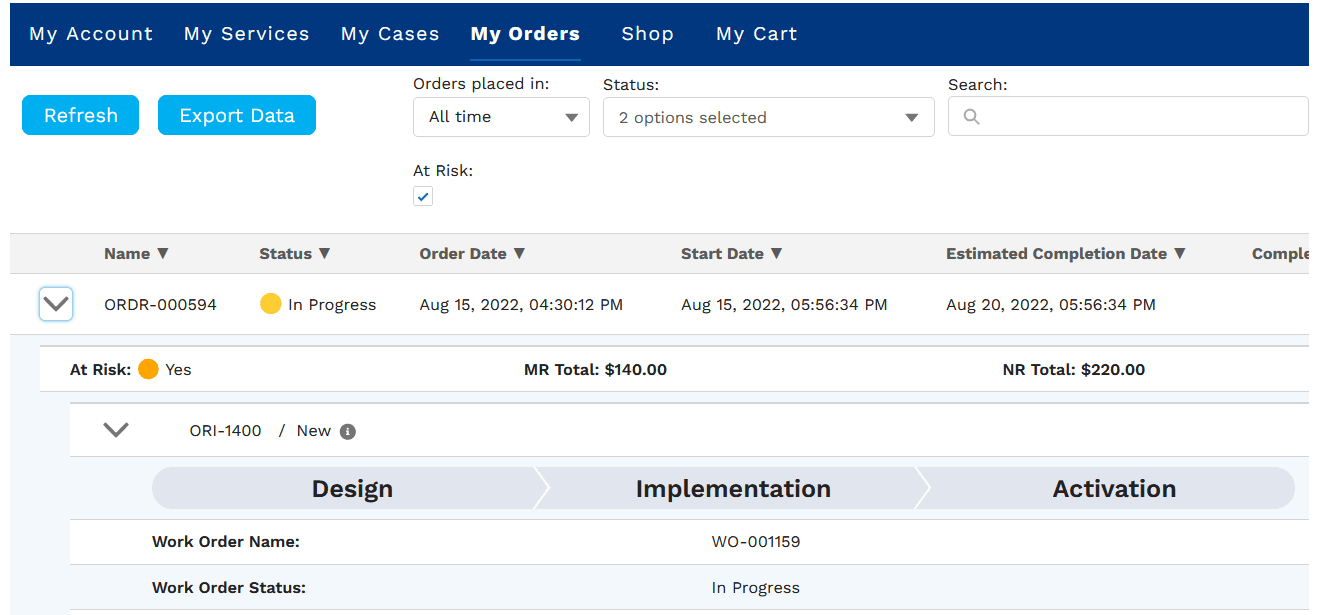Nextian provides a risk object to facilitate risk management during order delivery:
- Risks can be associated with an order (e.g., missing paperwork) and optionally, a work order (for a specific line item).
- A work order risk is always associated with the parent order (there can be no risk associated with a work order only).
- Risks can be active or resolved.
- Risks have an owner that may be an individual or a queue.
- If an order (or a work order) has at least one active risk, it is said to be at risk.
- Active risks to not prevent order and work order completion.
| Important | Risks are referred to as jeopardies in some industries (e.g. telco). |
Order risks are tracked in the custom Risk_c object:
| Field | Meaning |
|---|---|
| Risk Name | System generated, unique risk name/reference number in the RSK-XXXXXX format. |
| Title | One line title / summary describing the risk, e.g. ‘No more data center space available’. |
| Description | Optional risk description with additional details. |
| Origination | Risk origination: internal, customer, provider or reseller. It is used for reporting purposes and risk code selection (i.e., risk code depends on the origination). |
| Risk Code | Detailed risk reason code used for risk analytics. |
| Started On | Time risk condition started. |
| Resolved On | Time when risk condition was resolved. |
| Active | Checked indicates that the risk condition is still present, unchecked means that the risk has been resolved. |
| Resolution Code | A code indicating how risk was resolved for reporting purposes, required upon resolving a risk. |
| Resolution Description | Optional resolution description with additional resolution details. |
| Order | Order associated with the risk (required). |
| Work Order | Work order associated with the risk (optional). |
| Affected Net MRR | Net MRR (Monthly Recurring Revenue) affected by this risk: if risk is associated with a work order, work order Net MRR value is used (as the risk only pertains to the work order), otherwise Net MRR value from the order is used (aggregated across all line items and work orders) as the risk pertains to the entire order. |
| Affected New MRR | New MRR (Monthly Recurring Revenue) affected by this risk: if risk is associated with a work order, work order New MRR value is used (as the risk only pertains to the work order), otherwise New MRR value from the order is used (aggregated across all line items and work orders) as the risk pertains to the entire order. |
| Public | Determines risk visibility in the customer portal. If checked the risk is public and will be shown in the Customer Portal. By default risks are private. |
Dependencies between Origination, Risk Code and Resolution Code
Origination, Risk Code and Resolution Code are inter-dependent as follows:
Origination (Customer | Internal | Provider | Reseller)
→ Risk Code (dependent via field dependencies on Origination)
→ Resolution Code (dependent via field dependencies on Risk Code)
The dependency rules as well as code field values can be customized by system administrators.
Risks and customer orders
- At Risk flag is automatically set for orders that have least one active (unresolved) associated risk.
- At Risk flag is automatically cleared when all order risks have been resolved.
- Risks are shown on order details in Related → Risks.
- Unresolved risks do not prevent order completion.
- Active Orders At Risk list view is provided to identify active orders at risk.
Risks and work orders
- At Risk flag is automatically set for work orders and their parent orders that have least one active (unresolved) associated risk.
- Risks are shown on work order details in Related → Risks.
- Unresolved risks do not prevent work order and parent order completion.
- Active Work Orders At Risk list view is provided to identify active work orders at risk.
Risks and Salesforce chatter
New risk creation, resolution, reopening and deletion are shown in Salesforce chatter for orders and work orders.
Risks and Customer Portal
At risks orders are visualized in the Nextian Customer Portal as well as have a corresponding At Risk filter, however:
- Risk details are shown only on the order level
- Only Public risks are taken into consideration (i.e., if an order has a risk and the risk is private, order will be visible as at risk in the CRM, but not in the Customer Portal)


